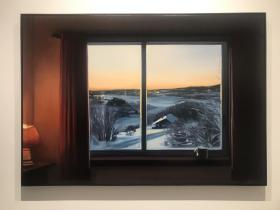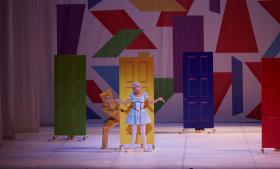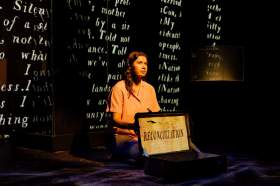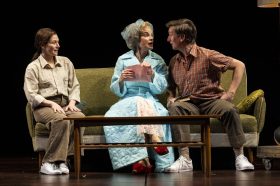At a fundamental level, art is an expression of what it means to be human – though invariably, every artist will have a different reason for making and viewing art. For some it is an attempt to reflect the ineffable; an exploration of the divine. For others it is a commentary on and a critique of our culture; a quest to encapsulate beauty; grappling with what it means to be alive.
For those of us working in the arts and cultural sector, it’s sometimes too easy to forget why we make art – instead we focus more on finding new audiences for it, or funding for our next project.
As the end of the year draws near, here at ArtsHub we thought it was important to pause for a moment; to reflect on art’s aesthetic and intrinsic value and to consider what value it has for us personally. Here, a range of artists and arts workers from around the country explain why art matters to them.
Wesley Enoch
‘Imagine a world without art. You wouldn’t listen to music to relax. You wouldn’t read the news to understand what was going on. You wouldn’t dance with strangers. You wouldn’t talk about a recent film with friends. You wouldn’t have a church to go to. You wouldn’t have family photos hanging on your walls. You wouldn’t communicate. You wouldn’t know what to do with creative thoughts. You wouldn’t know how to imagine a world. Art matters because it gives shape to the intrinsic human need to understand the world we are living in and in some way to shape it. There are elite artists like there are elite sportspeople and elite nurses, and they prototype creative endeavours for the rest of the tribe.’
Wesley Enoch is the former Festival Director of Sydney Festival.
Wendy Martin
‘It is impossible to imagine a world without artists. Art is made by people who have a burning desire to create and communicate and to illuminate, challenge and engage our hearts and minds – they are our great explainers and provocateurs. Art is essential and it should speak for and belong to all of us.
‘Right now the arts are undergoing a process of democratisation. It is exciting to find ways of bringing art into new contexts, generating new encounters and a new understanding of citizenship as a process of creative participation. Perth Festival’s Museum of Water is an example of a project that invites everyone in to tell their stories that reflect on their experience of the world as well as addressing pressing questions for the future.’
Wendy Martin is the former Artistic Director of Perth Festival.
Sarah Walker
‘It’s funny, how much time we spend trying to justify what we do in terms of dollars and tourism and ‘value added’. On the one hand, it’s ludicrous because art and culture have been proved time and time again to attract huge crowds and boost the economy and bring people from all over the world. It always has. But I think when we’re having these conversations, we forget why people are coming, why people are spending their money. Nobody flies to Tasmania and goes to MONA thinking, “I’m so pleased to be contributing to the government coffers,” or “Thank goodness I’m providing valuable tourism”. People go to MONA to be moved. People go to art to be moved. And sometimes that being moved involves laughing so hard your face hurts at a dumb comedy at the cinema. Sometimes it involves bursting into ugly tears because the musician you’re seeing at the Corner finally touched on the right notes to help you realise that you loved your ex. Sometimes it involves going to the kitchen to make a cup of tea, just as an excuse to hold the perfect stoneware mug you bought at the local market. Or missing your tram stop because you had to get to the end of the chapter of the book you’re reading.
Humans make art. We always have. We use it to feel, to understand, to push boundaries, to connect. Art is in almost everything we do – in the clothes we put on in the morning and the soap we use in the shower and the song we get caught in our head and the backgrounds on our phone – it’s everywhere. So sure, let’s justify it financially. But let’s not forget why we spend the money in the first place. It’s because art shows us how to feel. It makes our lives bearable.’
Sarah Walker is a photographer based in Melbourne, specialising in theatre and rehearsal photography, performance documentation and creation of PR material.
Neil Armfield
‘Art gives meaning to life. Of course life doesn’t have to have meaning, but art gives it meaning, and makes it better for that. It reveals its precious identity. Through refraction, reflection and play, it takes our physical and our psychological worlds – our objective and subjective, outer and inner worlds – and renders them in a way that is recognisable and, through its patterns and truth, beautiful. Through the miracle of story, we rehearse and re-enact our fears, our obsessions, our power, our weakness. It is through story that we form our moral consciousness: it creates the foundation and framework for human justice. ‘Because art changes with custom, practice and belief, and responds to the myriad systems and ecologies of the world, art inevitably distinguishes each society, each tribe, each family. Its differences as well as its shared energies help us to gather and to feel the particularity of our lives. And to understand others. ‘And it gives profound pleasure. It is what remains. Art is the means by which civilisations are remembered and judged. It is the proof of our existence and the measure of our worth.’ Neil Armfield is joint Artistic Director of Adelaide Festival.Rachel Healy
‘Culture connects all of humanity across the planet and across time. Scientific and lore based culture describes the place into which we were born and attempts to understand its workings but art is about the inner world of emotion, dreams and things that can’t be expressed in any other way. That’s why art matters: the outpourings of a billion unique minds cascade into a massive pool of human responses to being alive. The pool stretches from the Burrup rock art to the latest opera by Brett Dean, and it connects us all. We carry it with us through life, these days in our pockets as audio and visual files but more importantly in our heads as memories, trivial or transcendent, that make us reflect on our actions and shape the way we deal with each other. In this way individual expression, which can shock, repel, soothe, delight, elevate or humble, becomes a collective expression, and, once we’re gone, a message to the universe that produced us that we were here.’ Rachel Healy is joint Artistic Director of Adelaide Festival.Joseph O’Farrell (JOF)
‘I think about this a lot. I believe it’s important to understand what your core business is as a creator, to be clear in it, and let it steer you on your journey. For me, I’ve always wanted to “Be an artist and tour the World” and I am constantly developing that position
‘Art matters a lot, but I don’t necessarily believe the Australian GP understand what an “artist” really is. This is a huge drive in my work. I make it part of my mission statement to create artwork that opens that door for people, of all backgrounds and ages, to experience a genuine artistic process.
‘What truly interests me moving forward as an artist are some key questions: How can I make art that is accessible to people who aren’t the IN crowd? What if I lost all ego in performance-making? What if a creative process could be just as valuable to the community as to the artist? And what can I do to further my impact in the wider global community – still touring the world as an artist, but fertilising it rather than blazing a trail as I go?’
Joseph O’Farrell (JOF) is a multi-art performer, producer, curator, musician and lecturer.
Abdul Abdullah
‘I think one of the reasons art is important is because it gives artists agency. Art can give a platform to those who might otherwise be ignored.’
Abdul Abdullah is an artist from Perth, currently based in Sydney, who works across painting, photography, video, installation and performance. As a self-described ‘outsider amongst outsiders’, his practice is primarily concerned with the experience of the ‘other’ in society.
Rani Pramesti
‘Art matters because it is an expression of who we are at this point in time and is shaped by a porous relationship involving our bodies, families, communities, societies, ways of thinking, beliefs and so on. If we do not express who we are, then we do not really have a way of knowing who we are. We end up wandering about lost and aimless, knowing that something is missing, but not being sure what that “thing” is. I make theatre. That is the “art” that I make. My art is inspired by my family stories and our cultural heritage, straddling Indonesia, ancestors in China and an aesthetic crafted on Eora and Kulin countries. For me, my art matters because it is an act of honouring my ancestors. To be in dialogue with those that came before me is also part of knowing who I am. From there, I am able to orientate myself in the world. A crucial and necessary skill to have.’
Rani Pramesti is the Founder of RANI P COLLABORATIONS and a performance maker, an arts producer and an advocate for the arts. In all her roles, she builds bridges across cultures, generations and disciplines.
Alexie Glass-Kantor
‘Today, art matters more than ever as a way of reconciling the experience of our lives with that of the larger world – a world which appears to be reverting more than ever to flat binaries and narrow definitions. While the political aims to simplify our lives to policy and rhetoric, art has an important role in allowing for the difficult and to nourish paradox. Between the Brexits and Trumps of our current times through to Occupy and Black Lives Matter and the mass migration of entire communities, it matters that art can broaden the language of experience and offer a platform to deconstruct and consider an answer to the unfathomable.
‘Art acts as a connective thread, creating a space to comprehend difference, resist categories and to think through nuance. Art is an inexorable part of the ecology of the everyday. It proliferates within spaces in covert and overt capacities in order to push the thresholds and limits of definitions of subjectivity. Art, at its best, resists the confines of ideology, convention and tastes, to extend and question worldviews. Art does not necessarily need to have a responsibility to the social good, but it does have a responsibility to not recoil from the complicated everyday. To not acquiesce to the neoliberal ideology dominating globalised culture but to independently question and engage in myriad contexts.’
Alexie Glass-Kantor is Executive Director of Artspace, Sydney, supporting the commissioning of contemporary art, publishing initiatives, and research residencies for artists and curators. This is an extract from a presentation she gave at the Hong Kong Art Gallery Association Symposium in October 2016.





